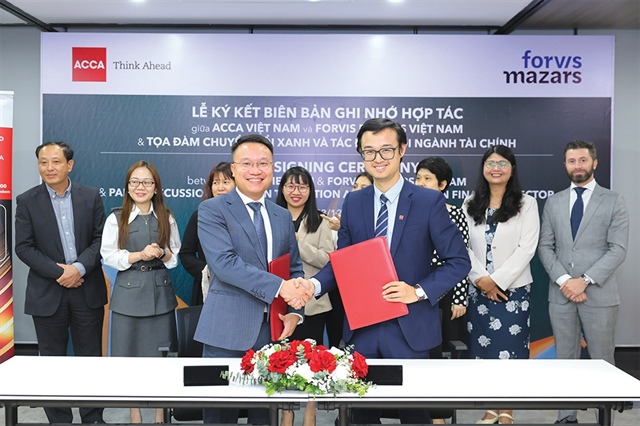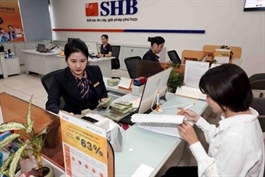Sustainability standards to drive the green transition
Sustainability standards to drive the green transition
To thrive amid the global green transition, Vietnamese businesses must continuously update their knowledge and align their strategies with evolving international sustainability standards. This adaptation is critical for competitiveness and long-term growth.
At a panel discussion last week between the Association of Chartered Certified Accountants (ACCA) and Forvis Mazars Vietnam in Hanoi, experts explored the green transition’s impact on Vietnam’s financial sector.

ACCA and Forvis Mazars Vietnam are to work together on green transition efforts |
The event brought together representatives from regulatory agencies, international organisations, and industry associations, highlighting the opportunities and challenges posed by sustainability.
“There are two main drivers of the green transition: business performance and mandatory regulations requiring compliance with green standards,” said To Quoc Hung, country manager at the ACCA Vietnam.
Hung pointed out that the ACCA, in collaboration with the Hanoi and Ho Chi Minh stock exchanges, has evaluated sustainability initiatives among listed companies. Recent years have seen a marked increase in sustainability reporting. In 2024, the number of companies publishing sustainability reports surged by 33 per cent, with the banking sector witnessing a significant rise from one to five institutions reporting annually.
“Vietnam’s regulations are increasingly aligning with global trends, particularly those in Europe,” Hung added. The ACCA has collaborated with the State Audit Office of Vietnam on environmental auditing and is optimistic that upcoming regulations will encourage local businesses to adopt sustainability practices.
According to Hung, sustainability initiatives not only enhance business performance but also drive financial gains.
“Research indicates that 78 per cent of studies link sustainability practices with better financial outcomes. As part of the ACCA’s efforts, we are launching a professional-level sustainability certification equivalent to the UK’s IQF Level 6 framework. This globally recognised certification, to be rolled out in 2024, will help professionals contribute meaningfully to green transformation,” he said.
Greater sustainability
Nguyen Hai Minh, chairman of Forvis Mazars Vietnam, emphasised that adopting sustainability goes beyond superficial commitments.
“Simply attaching the term ‘green’ to activities does not suffice. International frameworks such as the Organisation for Economic Co-operation and Development, the UN, and others provide critical guidelines for implementing sustainable practices effectively, which in turn enhance competitiveness and reputation,” Minh said.
He highlighted that free trade agreements between Vietnam and the EU incorporate sustainability commitments. These include supply chain transparency requirements under the Corporate Sustainability Reporting Directive (CSRD) and stringent measures like the Carbon Border Adjustment Mechanism (CBAM).
“While these regulations pose challenges, they also create opportunities for Vietnamese businesses to leverage green energy, enhance competitiveness, and position themselves favourably in global markets,” Minh said. “The EU’s ultimate goal is to encourage responsible business practices, fostering a fair and sustainable global economy.”
Lang Trinh Mai Huong, deputy director general of the Department of International Cooperation at the State Audit Office, highlighted the essential role of environmental, social, and governance (ESG) criteria in international business.
“In Europe, financial institutions only fund businesses meeting ESG standards. Banks are introducing green bonds and sustainability-linked loans to incentivise emissions reductions and improve environmental performance,” Huong said.
However, she stressed that ESG adoption is not just a compliance requirement but a strategic shift. “Businesses must recognise both the costs and long-term benefits of implementing ESG practices. Failing to demonstrate value could lead to missed opportunities, especially during financial crises.”
Building internal capabilities and proactively aligning with ESG principles are critical steps for Vietnamese businesses seeking to expand internationally. Examples of companies successfully leveraging green financing include seafood firms, which have secured concessional credit to enhance their supply chains sustainably.
Even traditionally “brown” industries such as steel, cement, and chemicals can benefit from the transition. By reducing emissions and adopting sustainable practices, these sectors can access green financial products such as bonds and loans designed to support environmental improvement.
Nguyen Tung Anh, vice chairman of the Sustainable Finance Committee at the European Chamber of Commerce in Vietnam, highlighted the importance of collaboration between businesses, governments, and financial institutions to balance economic growth with environmental protection.
“Despite the complexities of the green transition, it offers significant opportunities for Vietnam to strengthen its global position while advancing sustainability,” he said. “For instance, textile companies receiving green credit packages are upgrading technology to meet stringent environmental criteria in international markets.”
Anh also noted BIDV’s role in supporting Vietnam’s green transformation. The bank’s ESG loans and collaborations with the Asian Development Bank (ADB) exemplify how financial institutions are helping businesses align with global green standards.
“BIDV’s trade financing frameworks ensure that Vietnamese businesses using ADB funding meet green standards, supporting both the transition and global market demands,” Anh added.
Pros and cons
While many Vietnamese businesses are already embracing sustainability, challenges remain. Strict international standards require companies to invest in new technologies and overhaul traditional practices.
“Complying with regulations like the CBAM or CSRD can be costly, but they are essential for long-term competitiveness,” Minh said. “Businesses that successfully adapt will find themselves at the forefront of the global green economy.”
The panel discussion last week underscored the need for four key elements to achieve sustainable development: technical expertise, clear strategies, motivation, and access to investment capital.
With global green standards tightening, particularly in Europe, Vietnam is suggested to also focus on fostering innovation and collaboration. Businesses adopting sustainable practices will not only benefit from enhanced financial outcomes but also play a pivotal role in shaping a fair and resilient global economy.
Vietnam’s commitment to achieving net-zero emissions by 2050 reflects its determination to balance growth with sustainability. However, the journey requires collaboration across sectors.
“With stricter green standards in international markets, including Europe, BIDV is offering green credit packages to help textile companies upgrade technology and meet these environmental criteria,” said a BIDV representative.
“Additionally, BIDV is collaborating with the ADB to refine trade financing frameworks, ensuring Vietnamese businesses importing goods through ADB funding comply with the bank’s green standards. This initiative aims to support the green transition while helping businesses meet global market demands,” he added.




























